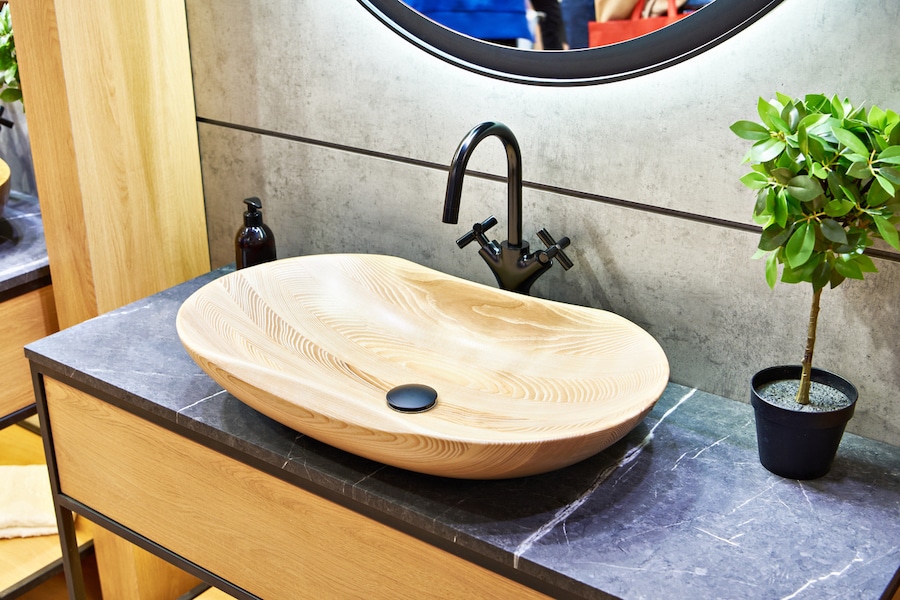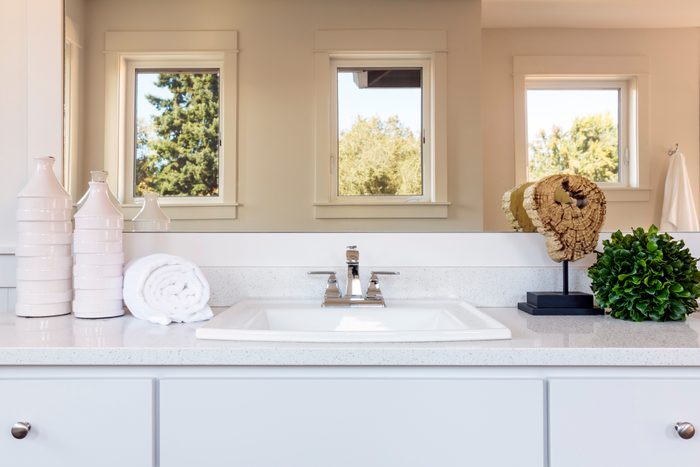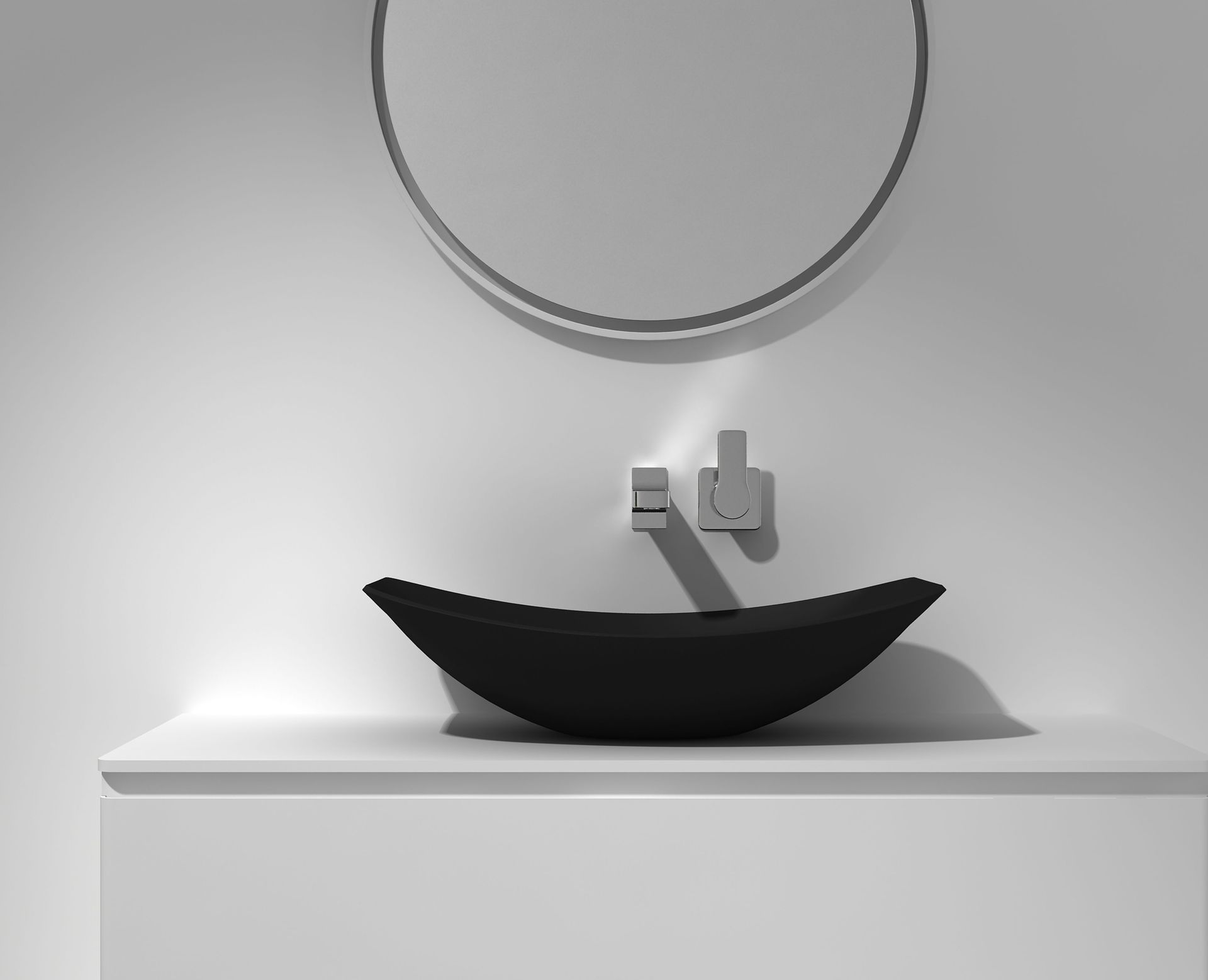18 min read
Choosing the right bathroom sink can completely change the look and feel of your space. But with so many options out there, how do you know which type suits your style and needs best?
Whether you want something sleek and modern or classic and practical, understanding the different bathroom sink types will help you make the perfect choice. Keep reading, and by the end, you’ll feel confident picking a sink that fits your bathroom—and your lifestyle—just right.
Common Bathroom Sink Styles
Bathroom sinks come in many styles to fit different spaces and tastes. Choosing the right style can improve your bathroom’s look and function.
Here are common bathroom sink types that you can consider for your next remodel or build.
Pedestal Sinks
Pedestal sinks stand on a tall, narrow base. They are classic and fit well in small bathrooms.
These sinks do not offer much storage but save floor space and look elegant.
Vessel Sinks
Vessel sinks sit on top of the counter like a bowl. They add a modern or artistic touch to bathrooms.
These sinks come in many shapes and materials, making them very customizable.
Undermount Sinks
Undermount sinks are installed below the countertop. This makes the surface smooth and easy to clean.
They work best with solid surface countertops like stone or quartz.
Drop-in Sinks
Drop-in sinks fit into a hole cut in the countertop. The rim sits on the counter surface.
These sinks are easy to install and replace, making them popular in many homes.
Wall-mounted Sinks
Wall-mounted sinks attach directly to the wall. They save floor space and give a clean look.
These sinks are good for small bathrooms or accessible designs.
Console Sinks
Console sinks combine a basin with legs or a frame. They offer some storage or shelf space below.
This style blends classic and modern elements and fits many bathroom designs.
Materials And Finishes
Bathroom sinks come in many materials and finishes. Each type offers unique looks and benefits.
Choosing the right material affects durability and style. It also changes how the sink feels and cleans.
Porcelain And Ceramic
Porcelain and ceramic sinks are very popular. They have a smooth, shiny finish that looks clean and bright.
These sinks resist stains and scratches well. They are easy to clean and fit most bathroom styles.
Glass And Stone
Glass sinks add a modern and sleek look. They come in clear, frosted, or colored glass.
Stone sinks use materials like marble or granite. They bring a natural, elegant feel to the bathroom.
- Glass sinks are fragile but stylish
- Stone sinks are heavy and strong
- Both need regular cleaning to stay bright
Metal Options
Metal sinks often use stainless steel, copper, or brass. They offer a shiny and modern look.
These sinks are durable and resist damage. Some metals develop a unique patina over time.
- Stainless steel is easy to clean
- Copper has natural antibacterial properties
- Brass adds a warm, vintage style
Composite Materials
Composite sinks mix materials like resin with stone or quartz. They offer many colors and textures.
These sinks are strong and resist chips or cracks. They also feel smooth and warm to touch.
- Easy to shape in many designs
- Lightweight compared to natural stone
- Low maintenance and stain resistant
Choosing The Right Sink Size
Bathroom sinks come in many sizes. Choosing the right size helps make your bathroom look good and work well.
Think about your bathroom space before picking a sink. The size affects comfort and style.
Small Spaces
Small bathrooms need sinks that save space. Compact sinks fit well and keep the room open.
Look for sinks that are less than 18 inches wide. Corner sinks are good for tight spots.
- Wall-mounted sinks
- Corner sinks
- Pedestal sinks with narrow basins
Standard Sizes
Most bathrooms use sinks between 19 and 24 inches wide. These sizes fit most vanities and counters.
Standard sinks offer enough space for daily use. They balance comfort and space well.
- Popular for single bathrooms
- Fits most countertops
- Easy to find styles and materials
Large Or Double Sinks
Large sinks or double sinks suit bigger bathrooms. They provide more space for two users.
Double sinks need wide countertops and enough room to move comfortably.
- Good for shared bathrooms
- Wide vanities support these sinks
- Offers extra storage space underneath

Credit: www.badeloftusa.com
Installation Considerations
Choosing the right bathroom sink is not just about style. Installation plays a big role in your choice. It affects plumbing, mounting, and fit with your countertop.
Knowing what to expect helps you avoid problems later. This guide explains important installation factors for bathroom sinks.
Plumbing Requirements
Each sink type needs specific plumbing setups. You must check the drain and water supply lines before installation. Some sinks need extra pipes or adapters.
Make sure your plumbing matches the sink’s design to avoid leaks and poor drainage. It is best to measure and plan ahead.
- Check water supply line locations
- Confirm drain size and position
- Use proper seals to prevent leaks
- Consider venting for good drainage
Mounting Types
Bathroom sinks come in several mounting styles. Each type changes how you attach the sink to the countertop or wall.
Common mounting types include top-mount, under-mount, vessel, and wall-mounted sinks. Choose one that fits your space and skill level for installation.
- Top-mount:Sits on countertop with visible edges
- Under-mount:Fixed below countertop for smooth look
- Vessel:Bowl sits above countertop
- Wall-mounted:Attached directly to the wall
Countertop Compatibility
Not all sinks work with every countertop. The material, thickness, and cutout size matter for proper fit and support.
Check that your countertop can hold the sink weight and shape. Some sinks need special cutouts or extra support brackets.
- Measure countertop thickness before buying
- Match sink cutout to countertop opening
- Use waterproof sealant to stop water damage
- Consider countertop material for sink mounting
Style Tips For Different Bathroom Designs
Bathroom sinks come in many styles and shapes. Choosing the right one can improve your bathroom’s look.
Different bathroom designs call for different sink types. Use style tips to pick sinks that fit well.
Modern Minimalist
Modern minimalist bathrooms need sinks with clean lines. Simple shapes like rectangular or oval work well.
Choose sinks with smooth surfaces and little decoration. Wall-mounted or under-mount sinks save space.
- Look for white or neutral colors
- Use materials like glass, porcelain, or stainless steel
- Keep faucets sleek and simple
Rustic And Traditional
Rustic and traditional bathrooms suit sinks with classic shapes. Pedestal and farmhouse sinks add charm.
Materials like porcelain or stone bring warmth. Choose sinks with detailed edges or vintage styles.
- Wood or bronze faucets match well
- Natural textures add character
- Consider vessel sinks for a rustic touch
Luxury And Spa-inspired
Luxury bathrooms use sinks that feel elegant and spacious. Large vessel sinks and double sinks are popular.
Materials like marble, glass, or quartz add a high-end look. Soft lighting highlights these beautiful sinks.
- Choose smooth, shiny finishes
- Match faucets with gold or chrome
- Use sinks with unique shapes or designs
Maintenance And Durability
Bathroom sinks come in many types and materials. Each type needs different care to last long.
Good maintenance keeps sinks looking new and working well. Durability depends on the material used.
Cleaning Best Practices
Clean your sink regularly to avoid stains and buildup. Use mild cleaners and soft cloths.
Avoid harsh chemicals that can damage the sink surface. Rinse well after cleaning to remove residue.
- Use warm water and mild soap
- Wipe with a soft sponge or cloth
- Do not use abrasive pads or steel wool
- Dry the sink after cleaning to prevent water spots
Scratch And Stain Resistance
Some sink materials resist scratches and stains better than others. Porcelain and stainless steel do well.
Avoid dropping heavy or sharp objects in the sink. Use protective mats if needed to prevent damage.
- Porcelain sinks can chip but resist stains
- Stainless steel sinks resist scratches and stains
- Stone sinks may need sealing to prevent stains
- Glass sinks can show scratches easily
Longevity Of Materials
Durable sink materials last many years with proper care. Choose materials that fit your bathroom use.
Regular cleaning and gentle use help keep sinks strong and looking good over time.
| Material | Expected Longevity | Maintenance Needs |
|---|---|---|
| Porcelain | 10-20 years | Regular cleaning, avoid hard impacts |
| Stainless Steel | 15-25 years | Clean with mild cleaners, avoid scratches |
| Stone (Granite, Marble) | 20+ years | Seal regularly, clean gently |
| Glass | 5-15 years | Clean carefully, avoid scratches |
Budgeting For Bathroom Sinks
Choosing the right bathroom sink fits your style and budget. Knowing sink types helps you plan costs well.
Sinks vary in price based on material, design, and size. This guide covers affordable, mid-range, and high-end sinks.
Affordable Options
Affordable sinks suit simple bathroom designs. They use common materials like porcelain and stainless steel.
These sinks are easy to find and install. They offer good quality for low prices.
- Drop-in sinks
- Pedestal sinks
- Wall-mounted sinks
Mid-range Choices
Mid-range sinks combine style and durability. Materials include glass, stone, and better ceramics.
These sinks offer more shapes and colors. They fit well in modern and classic bathrooms.
- Vessel sinks
- Undermount sinks
- Integrated sinks with countertops
High-end Designs
High-end sinks use luxury materials like marble and copper. They offer unique shapes and finishes.
These sinks often include custom features. They fit upscale bathroom styles and last many years.
- Custom stone sinks
- Designer vessel sinks
- Handcrafted metal sinks

Credit: www.familyhandyman.com

Credit: archipro.com.au
Frequently Asked Questions
What Are The Most Popular Bathroom Sink Types?
Popular bathroom sink types include pedestal, vessel, undermount, and wall-mounted sinks. Each offers unique style and space benefits. Pedestal sinks save floor space, while vessel sinks add modern elegance. Undermount sinks provide seamless counters, and wall-mounted sinks free up floor area for small bathrooms.
How To Choose The Right Sink For Small Bathrooms?
For small bathrooms, choose compact sinks like pedestal or wall-mounted models. These save space and maintain functionality. Vessel sinks can also work if space allows. Prioritize sinks with integrated storage or slim profiles to maximize room and keep the bathroom uncluttered and stylish.
What Materials Are Used For Bathroom Sinks?
Bathroom sinks are made from materials like porcelain, glass, stainless steel, and stone. Porcelain is durable and classic. Glass offers modern aesthetics. Stainless steel is sleek and easy to clean. Stone sinks provide a natural, luxurious look. Material choice impacts durability and style.
Are Vessel Sinks Suitable For Everyday Use?
Yes, vessel sinks are suitable for everyday use. They are stylish and easy to install. However, they may require more cleaning due to exposed edges. Proper faucet height and placement are essential for comfort. Vessel sinks fit well in modern, contemporary bathroom designs.
Conclusion
Choosing the right bathroom sink can change your space. Consider the style and size of your bathroom. Think about what fits best with your needs. Vessel sinks offer a modern look. Pedestal sinks save space in smaller areas. Undermount sinks provide a sleek finish.
Wall-mounted sinks add unique charm. Each type has its own benefits. So, make your choice based on your lifestyle and bathroom design. A well-chosen sink can enhance your bathroom’s beauty and function. Enjoy the process of selecting the perfect fit for your home.


